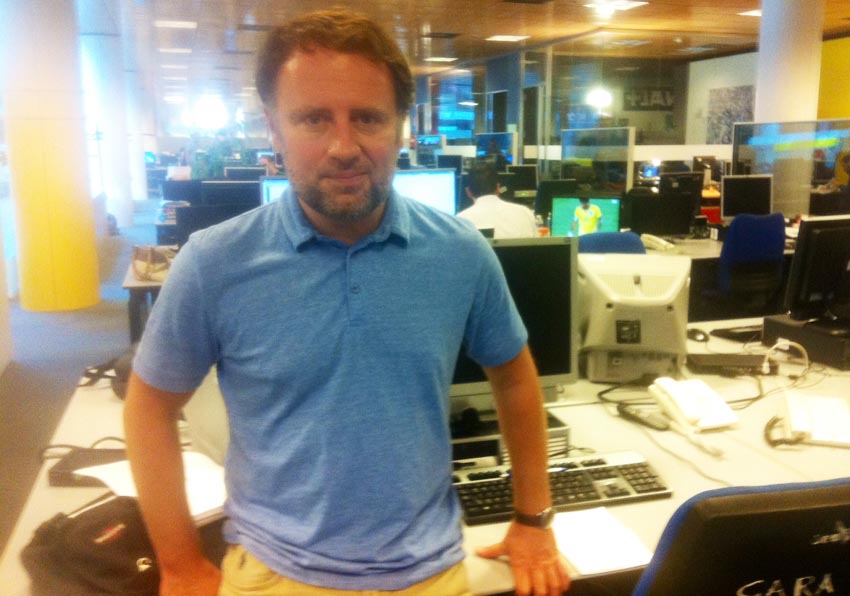Joseba Etxarri. He studied at the University of Navarre, going through the El Pais masters and also went to the Film School where he ended up learning documentaries direction. His first steps were taken in the Basque Country at radio Herri Irratia in Loiola and Donostia and then he jumped from regular news to sports when he began at Canal Plus, just a year after arriving to Madrid. He has worked in the Robinson Report since this program's beginning. In the show, sports serve as an excuse to examine the human profile and to get to know the spirit of many people who struggle and give the best of themselves to move forward and achieve goals, even if at first they seem difficult or unattainable. “Strive and try things, make goals in life and fight for them, even though sometimes you don’t succeed, it is worth it,” says our interview and spokesperson for some of these cases.
As a sportswriter you have attended various events from a privileged watchtower that gave you a job on TV
-I feel really fortunate because I work in a field that excited me and has allowed me to attend world championships, UEFA, World Marathons, leagues such as the NBA, baseball and to do it from the front row; speaking to and interviewing basketball players like Larry Bird, or athletes of the caliber of Ethiopian Haile Gebrselassie, or Italian soccer player Paolo Maldini or tennis player Rafa Nadal...It is a privilege to have the opportunity to work and get paid for something that you love and is your passion.
What is the Robinson Report for those who are not familiar?
-It is a monthly program on Canal Plus, of reports of long duration that talk about all kinds of stories related in one way or another to sports, but in the end has to do with personal challenges, with self-improvement and people facing disease and suing sports as a stimulus to advance and cling to life. We can track people who beat world records and see its more human reality, or put people that are not known on the map, because their story of survival is worth telling. On September 24, for example, we will air the story of an African boy that has until the age of 17 lived in a very humble manner on an island of Cape Verde and who five years later is playing for the NBA. He is 2 meters 21 centimeters tall (7 feet 3 inches) and is the top player in the league. His name is Walter Tabares and we were with him in Cape Verde before he left to play for the Atlanta Hawks.
You must have thousands of anecdotes and episodes to talk about.
-I was really moved, for example, to meet Larry Bird, one of the most important basketball figures of all time; far from being a figure, to me he seemed to be a very simple, super-nice, and a very approachable man, like the son of a small Indiana town that he is, affable and a farm boy just like any one of our baserritarras. The program we did on Navarran climber Iñaki Ochoa de Olza, was touching. After the accident that he had on Annapuma in 2008, the solidarity shown by the 14 elite climbers who decided to come to his rescue was impressive. Or a report that we did on soccer and Alzheimer’s, seeing hat how patients affected with this disease trigger memories and recall through soccer and talk about episodes and lineups of over forty years ago, to the astonishment of their children. I would also stress the simplicity of a number of sports figures that is far from what many may think, they act normally, people like Andrés Iniesta, Johan Cruyff...
What’s it like to live in Madrid?
-It wasn’t my plan but I’ve already been here for 19 years and my daughter was born here, she’s 12, and my son is 10. Of all the cities in the world that I know, I feel like this is one of the most open. I came here without knowing a soul, with some classmates and it has gone very well for me. I would like to be closer to Tolosa and be with my mother and family more. We usually go on special occasions, in summer. My wife is from Iruña and so we split our time there.
Are there many Basques in the Madrid Diaspora?
-Many. From co-workers on the same channel, also in journalism in general….Not too long ago I commented to some friends that sometimes, when you have been abroad a long time, people leaving in your country or hometown, some at least consider you semi-foreigner and that’s not fair. Those who live there don’t know how you feel or what circumstances resulted in your living elsewhere. I have good friends from Tolosa in Argentina, another in Chile, a friend from Donostia in Cape City…and you don’t know how nostalgic you can get, the vacuum from not being in your home land. People who haven’t lived it, don’t get it.






 Send to a friend
Send to a friend Add comment
Add comment








